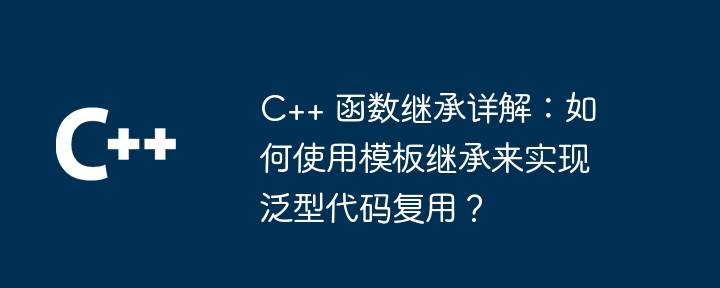
C Function inheritance realizes generic code reuse through template inheritance, allowing the creation of general function templates, and then inheriting more specific functions to customize different data type behaviors. Code examples include print container functions that custom print integer and string containers through inheritance. Function inheritance enhances code reuse, readability, maintainability, and easily extends function behavior through inherited classes.

Detailed explanation of C function inheritance: using template inheritance to achieve generic code reuse
Introduction
Inheritance is a basic and powerful feature in object-oriented programming. It allows subclasses to inherit the properties and behavior of the parent class regardless of the parent class's implementation details. In C, function inheritance is a powerful technique that allows us to create generic and reusable code.
Template inheritance
Template inheritance involves creating class or function templates and then creating a series of more specific classes or functions that inherit from those templates. This allows us to define a common set of behaviors and then customize these behaviors for different data types or concepts.
Code Example
Let us consider a simple example of printing any type of container. We first define a generic function template for printing containers:
template<typename T>
void printContainer(const T& container) {
for (const auto& element : container) {
cout << element << " ";
}
cout << endl;
}Now, we can create more specific functions inherited from printContainer, such as for printing integer containers and string containers :
template<>
void printContainer<int>(const vector<int>& container) {
// 定制打印整数容器的特定逻辑
// ...
}
template<>
void printContainer<string>(const vector<string>& container) {
// 定制打印字符串容器的特定逻辑
// ...
}Practical case
Suppose we have the following code snippet:
vector<int> intVector = {1, 2, 3, 4, 5};
vector<string> stringVector = {"Hello", "World", "!"};We can use our custom function to print these containers:
printContainer(intVector); printContainer(stringVector);
This will print the container element while performing custom logic based on the different container types.
Advantages
Functional inheritance provides the following advantages:
The above is the detailed content of Detailed explanation of C++ function inheritance: How to use template inheritance to achieve generic code reuse?. For more information, please follow other related articles on the PHP Chinese website!
 What are the differences between c++ and c language
What are the differences between c++ and c language
 Recommended learning order for c++ and python
Recommended learning order for c++ and python
 Cost-effectiveness analysis of learning python and c++
Cost-effectiveness analysis of learning python and c++
 Is c language the same as c++?
Is c language the same as c++?
 Which is better to learn first, c language or c++?
Which is better to learn first, c language or c++?
 The difference and connection between c language and c++
The difference and connection between c language and c++
 C++ software Chinese change tutorial
C++ software Chinese change tutorial
 Cost-effectiveness analysis of learning python, java and c++
Cost-effectiveness analysis of learning python, java and c++




